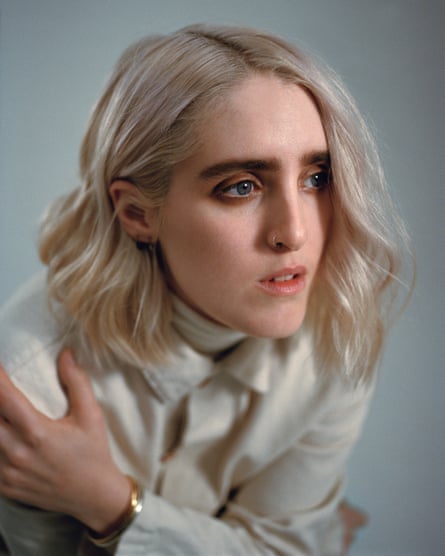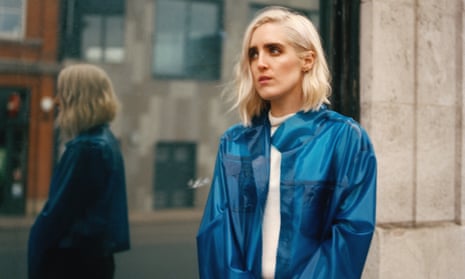In 2014, Shura uploaded a song to SoundCloud on a whim. Refreshing her phone during breaks at her old job at a post-production company, she gawped at what she saw. The track, Touch, surged in popularity, and Shura – real name Aleksandra Denton – decided to film a video on a shoestring budget, blowing most of it on smoke bombs. The video features a procession of couples of various genders kissing in a haze of lilac. This also went viral, with views spiralling quickly into the millions. The momentum didn’t slow: she was nominated for the BBC’s Sound of … shortlist at the end of the year, and signed a record deal with Polydor.
“It was like getting undressed in front of people!” Shura says when we meet in her old hometown of Shepherd’s Bush, London, reflecting on the pressures of making a debut album under the world’s gaze. She sips black coffee and puffs on a vape as we talk, hiding under a white baseball cap nicked from her own merch stand. “It’s no coincidence that the first panic attack I’ve ever had in my life was during the making of my first record.” The New York Times said the result, Nothing’s Real, approached “something like perfection”. “It was a really strange experience to go from being a nobody to a semi-somebody,” she says. Then her relationship broke down, crumbling under the strain of a relentless touring schedule. “It couldn’t handle the shift,” she shrugs.

Love aside, Shura achieved more success than she had ever dreamed of. As time went on, however, she began to grow anxious about how she slotted into the glossy major-label world. “I’m never going to have another Touch,” she says. “That was just a magic moment. When you have a viral video that you made yourself, with a budget of 900 quid, it puts you in a good position to be like, ‘I know what I’m doing.’ Even if you don’t.” Her album peaked at No 13, then disappeared, spending only two weeks in the UK chart. “I was frightened I would lose my leverage because, by the label’s standards, Nothing’s Real wasn’t a roaring success. By mine, it was.”
She was relieved when Polydor dropped her. “It’s like when you’re in a slightly shit relationship,” she jokes. “I got myself dumped.” But stepping away gave her an opportunity to get on with living life unwatched: no more pressure to keep the hype machine fuelled. “I feel like if I had stayed on a major label, I would’ve needed to carry on putting out things,” she says. “Whether it was me singing on someone else’s track, or appearing somewhere, at some event. Doing all these things to remind people you exist. I felt like the most sane thing I could do for myself was to be quiet until I had something to say.”
Now signed to the indie label Secretly Canadian, being the sort of pop star who passes slightly under the radar suits Shura more than the prospect of arena tours and big co-signs. “I’m thrilled to be in a place where I’m walking past posters of all the records I bought and loved that year: Bon Iver, Angel Olsen, Japanese Breakfast, Mitski, Moses Sumney. I feel like I’m part of this weird family.”
She has recently moved to the States. Why? “Bodegas,” she deadpans, referring to those Aladdin’s cave delis you get in New York. “I’m just obsessed. If you went to a newsagent’s here, you’d get maybe a Tropicana, if you’re lucky.” It’s not the whole story: after two years of touring her debut, Shura was exhausted and homesick. Still, before catching a flight home, she made a brief detour to Minneapolis, where she holed up to write new material and drink white Russians. It was here she fired up a dating app and swiped right on her now girlfriend, who lives in New York.
“Trump getting elected and the [Chicago] Cubs winning the baseball world series, that was the beginning of my relationship,” she says. Spurred on by long-distance lust, Shura hashed out the vague sketch of lead single Religion (U Can Lay Your Hands on Me) – a desire-drenched slab of slinky funk. “I started writing the song before we met, which is funny, because it’s my most sexy, physically explicit song,” she says. “We had never seen each other in 3D!”
Thankfully, their meeting went according to plan (new single The Stage is based on their first date at a gig by synthpop trio Muna) and so, instead of settling back into her London flat, Shura boxed up her belongings and relocated across the Atlantic. “I should just call [the record] U-Haul,” she jokes, referring to the stereotype of how quickly lesbians can enter into intense relationships, and move in together within a matter of weeks. “I moved to a different country, a different place. I U-Hauled. I can’t think of anything more lesbian than going to New York for a first date.”
While debut Nothing’s Real veiled uncertainty, insecurity and debilitating anxiety inside glimmering, pop-shaped Trojan horses, its successor emits the pure blue warmth of its cover image, despite the turmoil in her new home country. “It’s been very weird to have America as the backdrop to a love affair,” she says. “It’s a queer love story, with the backdrop of the US at its most horrific.” Accordingly, Forevher’s love songs are warped and strange, filled with classic, old-timey melodies. Though Shura doesn’t share the acrobatic strut of some of her biggest influences – Whitney Houston and Patrice Rushen, to name two – Forevher leans heavily into soul, her unembellished vocal exposed. “Piano in major sevenths, or traditionally jazzy chords borrowed from soul records – that’s something I would’ve been allergic to in the past,” she says. “Well, not allergic, but afraid.”
In essence, she strove to write a traditional love record, with an ambiguous, queered slant. “Taking a classic image and twisting it,” she says. “So much of pop is geared towards straight desire that queer fans continually make small, mental adjustments to create space for their experiences in the mainstream. We’re so used to doing that. It’s in our programming.” With Forevher, she wondered whether it was possible to do it the other way around. “Would straight people find it as easy to do the same? I’m guessing probably not. Also, maybe they would?”

But the tide is beginning to turn, thanks to a wave of queer artists pouring into the mainstream. Record labels are eager to associate with queer culture. Though she’s not experienced it, Shura finds herself sceptical of marketing teams seizing on sexuality as a selling point. “It would be really nice to get to a place where we don’t need to write in a press release, ‘Queer person does … ’” she says. “It’s OK to be overtly queer. One of the best things about queer culture is overtness. But I would love more room for incidental queerness.”
At her new label, Shura is enjoying the opportunity to ask all of these questions. “Musicians are often reduced to the lowest common denominator in general,” she shrugs.
If Nothing’s Real was pegged as an album about “being a queer woman in London”, now Shura will be “the person with fancy hats,” she announces, looking pleased, and referring to her new stage gear – a wide-brimmed number in Yves Klein blue. “It was really funny thinking about the amount of times Polydor had told me to dress up, front and centre and be a pop star.”
And so, of course, for her first video on an indie label, she’s dressing up in a fancy costume – lesbian pope, is how she bills it – “and standing there vaping, pretending to be a pop star,” she laughs. “Well, being a pop star.” She pauses and revises her thought. “I have no expectations.”
